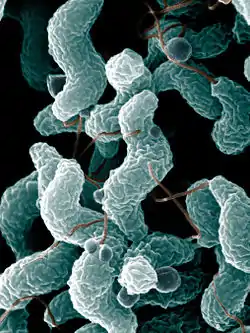Campylobacterales
The Campylobacterales are an order of Proteobacteria which make up the epsilon subdivision, together with the small family Nautiliaceae. Like all Proteobacteria, they are Gram-negative. Most of the species are microaerophilic.[1]
| Campylobacterales | |
|---|---|
 | |
| Campylobacter jejuni bacteria | |
| Scientific classification | |
| Domain: | Bacteria |
| Phylum: | Proteobacteria |
| Class: | Epsilonproteobacteria |
| Order: | Campylobacterales |
| Families and genera | |
| |
Molecular signatures
Comparative genomic analysis has led to the identification of 49 proteins which are uniquely found in virtually all species of the order Campylobacterales. Additionally, two conserved signature indels have been identified which, along with the proteins, serve as molecular markers for the order. The indels are a three-amino-acid insertion in the B protein of the Uvr ABC system, and a two-amino-acid deletion in phenylalanyl-tRNA synthetase.[2]
References
- Garrity, George M.; Brenner, Don J.; Krieg, Noel R.; Staley, James T. (eds.) (2005). Bergey's Manual of Systematic Bacteriology, Volume Two: The Proteobacteria, Part C: The Alpha-, Beta-, Delta-, and Epsilonproteobacteria. New York, New York: Springer. ISBN 978-0-387-24145-6.
- Gupta, R. S. (2006). Molecular signatures (unique proteins and conserved indels) that are specific for the epsilon proteobacteria. BMC Genomics. 7:167.
This article is issued from Wikipedia. The text is licensed under Creative Commons - Attribution - Sharealike. Additional terms may apply for the media files.